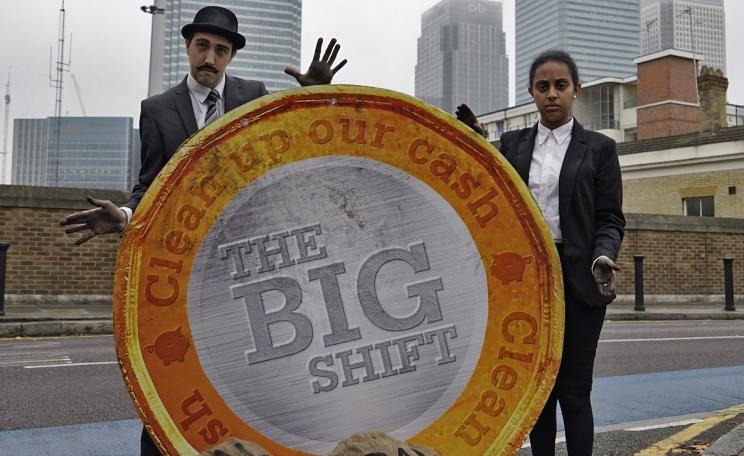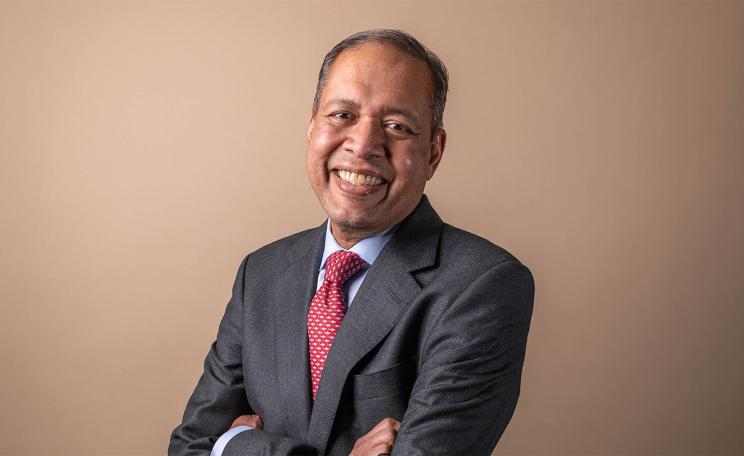Barclays, HSBC and the Royal Bank of Scotland (RBS) are three of the largest banks in the UK, with a combined £200 billion in capital and serving almost 190 million customers worldwide. They have also been heavily criticised for their involvement in some of the most ecologically damaging energy projects around the world in the past decade.
Energy companies are some of the most profitable companies in the world and are thus a reliable and attractive target for bank loans. Their energy projects – which range from tar sands in Canada to hydroelectric dams in Chilean Patagonia – rely on banks for loans and credit facilities.
When it comes to financial involvement, it has become difficult to track the specifics of a bank’s monetary investment. Banks used to direct loans to support to specific projects says Mel Evans, from the campaign group PLATFORM. However, since the 2008 financial crisis, banks have reverted to supplying companies with corporate loans, which don’t specify where the company is then spending the money.
‘All the money goes into a sort of pot. The money goes to [a company], but it doesn’t go to them for a specific project,’ says Iain Thom, spokesperson for the campaign group World Development Movement (WDM). The investments are further complicated by syndicated loans, corporate loans from a consortium of banks, with the portions invested from individual banks often undisclosed.
As well as loans, banks also provide so-called 'revolving door' credit facilities where a bank provides a certain amount of credit for a certain length of time – usually several years – from which the company can withdraw.
Banks are generally unwilling to disclose the details of this kind of financing. ‘Part of it is client confidentiality, and it’s also industry practice,’ says Thom. ‘In past years we’ve seen a bit of improvement in disclosure, but when it comes to something big like climate change we think the banking sector should be doing more to disclose what financing it’s providing to really destructive projects,’ he says.
Here's a look at the some of most controversial and environmentally destructive projects the UK's three biggest banks are supporting:
The Royal Bank of Scotland
Once known as ‘the oil and gas bank,’ RBS has taken steps in recent years to distance itself from the fossil fuel sector, at least on the surface. Direct loans for projects in the renewables sector has enabled RBS to claim on their website: ‘Since 2006, we have provided more finance to wind power projects than any other type of energy project.’ Through corporate loans, however, RBS has been involved in billions of pounds of finance to the fossil fuel sector, including nearly £13 billion since the bank was given a £45.5 billion bailout by the UK government in 2008 – the UK taxpayer now owns more than 80 per cent of the bank and have owned a majority stake for the past three years.
‘They’re energy specialists, really,’ says Thom. ‘They’ve made strategic decisions to make investments and gain expertise in the energy sector.’
RBS’ activities in financing fossil fuel companies are characterised by the recent revelation they have provided French energy giant Total with more than £300 million in corporate loans since it started exploring tar sands development in Madagascar in 2008. Local groups have been campaigning to halt the mining, fearing a repeat of the severe water pollution affecting communities near tar sands projects in Alberta, Canada. The pollution has been blamed for higher than normal rates of cancer in nearby First Nations communities. RBS also provided £7 billion in finance to nine companies with tar sands projects in Canada between 2007 and 2009. In the same period, Barclays and HSBC were involved in providing £8 billion and £5 billion in financing respectively.
RBS together with nine other banks helped provide £1.7 billion in finance to European oil and gas company Perenco in May 2010. They are attempting to drill for oil in the Province of Loreto in northern Peru, one of the most bio-diverse regions in South America. It is home to one of the last uncontacted indigenous tribes in the world.
In March 2009 RBS helped raise £116 million in finance for Scottish oil company Cairn Energy as they increased their drilling operations in Greenland. That same month the bank was involved in financing Irish oil company Tullow Oil’s operations in the sensitive Uganda-DRC border regions. RBS was part of a 14-bank consortium providing Tullow with a £1 billion corporate loan, £61 million of which RBS provided itself; the bank also helped raise £246 million by selling shares in Tullow in January of that year. On-going attempts to control oil and natural resources is continuing to drive conflict in Eastern Congo, according to the campaign group PLATFORM.
Other notable projects include the Sakhalin II project in the Russian Far East, a dual oil and gas extraction project and the largest of its kind in the world. In April 2007 RBS arranged an estimated £1.2 billion corporate loan to Gazprom, the Russian energy giant with a majority stake in the Sakhalin Energy Investment Company (SEIC). SEIC has been criticised for not consulting indigenous communities and not having proven response techniques to cover accidents all year round. The project also threatens the last 120 critically endangered Western Gray Whales with extinction, as well as salmon, who spawn in nearby rivers victim to various disturbances from 800km of onshore pipelines.
RBS supplied various companies with corporate loans during the US coal rush from 2004 to 2005. This money was put towards mountaintop removal coal mining, responsible for severe water pollution in some of America’s poorest regions in the Appalachian mountains through waste water from cleaning coal and the dumping of waste earth in or near streams. RBS issued credit and shares to US coal producer Alpha Natural Resources in 2005 and gave corporate finance and loans to US coal producer Arch Coal in 2006. Much of this finance was inherited through RBS’ £49 billion takeover of Dutch bank ABN Amro, in October 2007, in what was at the time the biggest bank takeover in European history. It was followed a year later by the bank’s collapse and public takeover.
Barclays
Barclays has been involved in providing more than £30 million in finance to Indian mining company Vedanta Resources between 2004 and 2009 for a Bauxite mine in India’s Niyamgiri Hills. The mining projects have resulted in widespread illegal tree felling, water scarcity and pollution, and have intruded on the isolated Dongria Kondh tribe. RBS has also been heavily involved in Vedanta’s bauxite mine – a large portion inherited from the ABN Amro takeover. It issued bonds to Vedanta in 2004, and was involved in organising and issuing corporate loans between 2004 and 2009 for both Vedanta and its partners Sterlite and Hindustan Zinc.
In Indonesia, the Grasberg mine, operated by American mining company Freeport McMoran, is the largest gold mine in the world and the third largest copper one. The mine dumps 230,000 tonnes of waste in the nearby Aghawagon River every day, making water undrinkable and unfishable.
Owners of Freeport have been criticised for bribing soldiers and police to torture and murder members of the indigenous population.
Barclays owns or manages shares in Freeport that amount to more than £277 million. RBS participated in a £27 million corporate loan in March 2007 when Freeport acquired competitor Phelps Dodge for almost £16 billion. It also contributed £185 million to a seperate £6.1 billion syndicated loan to Freeport. HSBC have provided a £27 million corporate loan and contributed £185 million to a £6.1 billion syndicated loan to the company by a number of banks in 2007.
In May 2007, Barclays provided Dynegy-LS Power with a credit facility as they try and build 12 new coal-fired power plants across eight American states. Coal-fired power plants are the leading source of greenhouse gas emissions in America; the new Dynegy plants would put out more than 65 million tonnes of CO2 emissions a year – including dangerous toxins like mercury, sulphur dioxides and nitrous oxides.
Swedish oil company Lundin Petroleum is currently being investigated for war crimes stemming from its exploration for oil in war-torn southern Sudan from 1997 to 2003 with Sudapet, the Sudanese national oil company. Barclays owns or manages shares amounting to £6 million in the company. RBS participated in a £611.2 million loan to Lundin in 2007.
As of October 2010 Barclays – by way of its subsidiary Absa-Barclays – have been advising state-owned South African energy company Eskom on implementing a multi-billion pound bond programme to finance construction of the Kusile coal-fired power plant in South Africa’s Mpumalanga province. The plant would be one of the largest coal-fired power plants in the world, emitting 36.8 million tonnes of CO2 equivalent every year and increasing South Africa’s energy sector emissions by 12.8 per cent. The project will displace around 300 people and bring little benefit to South Africans as more than half of project financing will be spent on imported equipment and hiring foreign specialists. HSBC participated in a December 2009 syndicated corporate loan to Eskom worth £627 million.
HSBC
European power company Endesa and Chilean company Colbún have been pursuing a joint project – named HidroAysén – to construct five hydroelectric dams in Chilean Patagonia since 2008. HSBC contributed £17.7 million in a £244.5 million syndicated loan to Colbún in 2008, and were involved in a £14.2 million corporate loan to Endesa later that year. The dams will displace families, disrupt livelihoods and spoil tourism by flooding ranching and agricultural lands. A 2,450km transmission line for the project would cut a 12-metre wide corridor through rainforests and communities that support a high degree of biodiversity, including the endangered huemul deer. RBS contributed £24.4 million to the £244.5 million syndicated loan in August 2008, participated in a £195.6 million syndicated loan to Colbún in May 2006 and provided Endesa Chile with corporate loans of £30.6 million and £13.4 million in 2006 and 2008.
HSBC underwrote or managed shares or bonds worth £122,240 in 2010 for Archipelago Resources, operating the Toka Tindung gold mine in Indonesia. Tailings contamination from the six open-pit mines are responsible for groundwater contamination eroding the local fishing and tourism industries and threatening nearby nature reserves and endangered species. Barclays also underwrote or managed shares or bonds worth £207,808 for Archipelago in 2010.
In 2009 HSBC gave a corporate loan to a consortium of four Indian and South Korean energy companies led by South Korean industrial giant Daewoo International for a series of natural gas extraction platforms in the Bay of Bengal off the Burmese coast. It is now the primary banker for the China National Petroleum Corporation (CNPC), who are piping the gas through the Shwe pipeline in Burma to southwest China. CNPC’s subsidiary PetroChina will distribute the gas. HSBC also own or manage shares in CNPC worth £162 million. No Environmental Impact Assessment has been released for the project, which runs through many delicate ecological areas, and CNPC’s pipeline has instigated conflict in the disputed areas in Burma it traverses. The use of Burmese military for protection has led to allegations of forced relocations, sexual assault and land confiscation. In Feburary 2007, RBS contributed £14.2 million to a syndicated loan for PetroChina. Barclays own or manage shares in PetroChina totaling around £389 million.
In 2010 HSBC were chosen as a financial adviser by the Bulgarian government to conduct a financial analysis and attract new investors to finance the construction of the Belene nuclear power plant, which has struggled to get beyond the planning stages since the plans were introduced in the 1980s. There have been allegations of corruption in the tendering procedure for the plant, and outspoken critics of the plant and nuclear development in Bulgaria have received death threats and in some cases, forced to relocate.
HSBC have issued bonds to Total as they continue to exploit natural gas deposits on the Burmese coast, compounding problems caused by offshore gas exploitation. Campaigners say Total’s involvement also perpetuates human rights abuses carried out by the Burmese government in protecting these fossil fuel projects.
Useful links for further information
Banksecrets
Banktrack
Platform
War on Want
| READ MORE... | |
 |
NEWS RBS labelled ‘dirtiest bank in Britain’ Pressure groups take Treasury to court for second time in a year over failure to assess the environmental and human rights impact of RBS |
 |
NEWS UK urged to stop funding dirty coal power stations overseas Overseas aid still being channelled by DFID through the World Bank who is investing record amounts in coal-fired power stations |
 |
NEWS Barclays Bank, British Gas and RBS implicated in ‘scandalous’ carbon trading scheme British companies accused of profiting from emissions trading scheme while consumers foot the bill |
 |
NEWS RBS: where the public money has gone Treasury accused of writing a 'blank cheque' with taxpayers' money for bank to make environmentally-damaging investments |
 |
NEWS Goldman Sachs makes $1 billion profit on food price speculation 'Risky and secretive' gambling on the price of coffee, cocoa and wheat is leading to unstable food prices and exacerbating poverty and malnutrition but creating billions of pounds for the banking sector |







